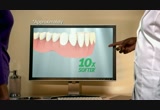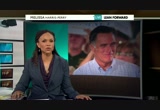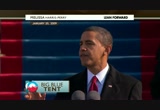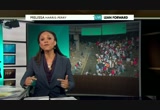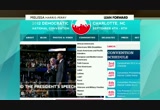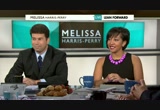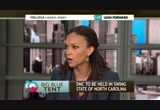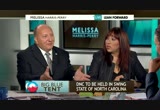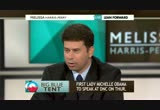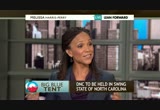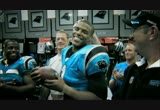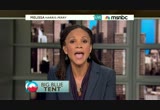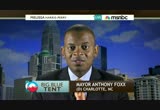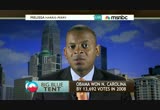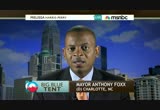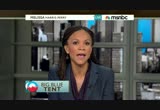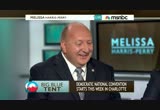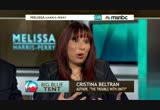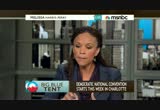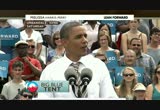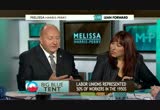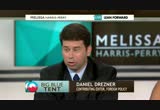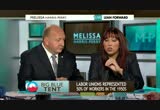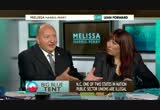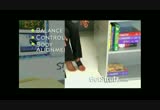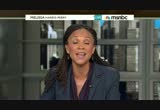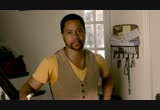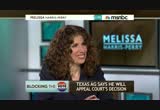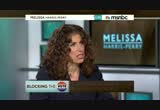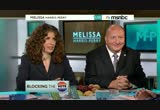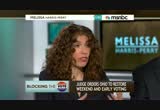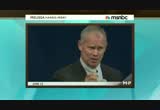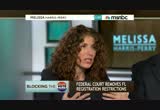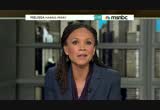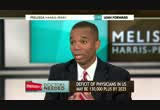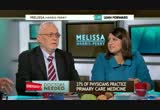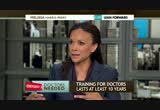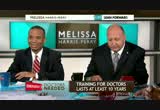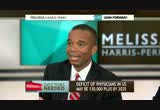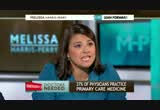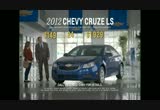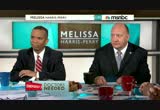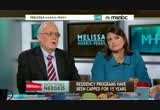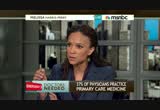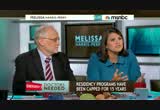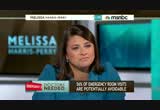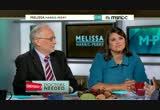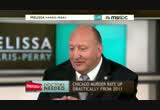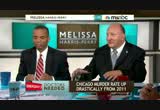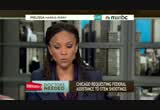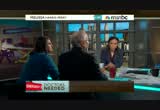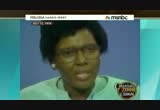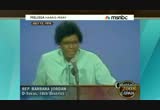tv Melissa Harris- Perry MSNBC September 2, 2012 7:00am-9:00am PDT
7:00 am
es where bacteria can multiply. polident is designed to clean dentures daily. its unique micro-clean formula kills 99.9% of odor causing bacteria and helps dissolve stains, cleaning in a better way than brushing with toothpaste. that's why i recommend using polident. [ male announcer ] polident. cleaner, fresher and brighter every day. this morning, the tide is turning, and democracy is returning. try to suppress this. plus, all eyes on north carolina this weekend. not even college basketball season. and the other health care crisis. there are not enough doctors in america. but, first, down in charlotte, pitching a big blue tent much eats see what's going on in there.
7:01 am
ed good morning, i'm melissa harris pier. the republican national convention to a close, the campaign is back out on the road. he talked about the reading material he used to help him with his convention speech. >> one of the speeches i read was the convention speech of barack obama, not one of the ones i wanted to draw from, but i couldn't resist a couple of things he said. he made a lot of promises. and i noted he didn't keep a lot of promises. >> so while i don't agree with his conclusion, i couldn't resist following mr. romney's lead in going back to a few of president obama's speeches as we gear up for the democratic national convention. here he is on inauguration day 2009. >> for everywhere we look there, is work to be done. the state of our economy calls for action, bold and swift and we will act. not only to create new jobs, but to lay a new foundation for growth. we will build the roads and bridges, the electric grids and
7:02 am
digital lines that feed our commerce and bind us together. >> >>. >> mere moments after taking office, president obama told the hard truth truth and got right down to business. before we talk about the president's work, let's remember that before he was able to take the oath of office, candidate obama had to do a lot of work to get to the podium. we know the story of the young state senator who wowed us at the 2004 dnc and on 2008 took on one of america's best oiled political machines, inspired a generation, a generation. the timeline to success has many notable moments in between, rarely do we mark august 2005 as a turning point for the working senator. when the force of hurricane katrina devastated the poorly maintained levees around new orleans, those floodwaters brought with them devastation for those in their wake and a
7:03 am
wakeup call to the nation. our fellow americans watched in horror as our government fumbled and failed to alleviate human suffering right in this country. in the midst of the crisis, we asked how an administration, unable to get water to an american city for three days, could be trusted to conduct a just war abroad. we asked ourselves, what else is broken with our government? that next fall, the democrats regained the majority in congress and the 2006 mid term election was a clear-cut rejection of the image of america that left new orleanians left on the roofs of their homes. that's not the america we wanted to we y you see, we decided in that moment we were no longer the america that would leave either metaphorically or actually americans trapped and unable to be rescued. after hurricane katrina
7:04 am
americans were grasping for a way forward and one way was to return the democrats a coalition party to the majority of the u.s. house. democrats who have been trying to outrepublican the republicans since clinton's right ward shift a decade earlier found their spine and voice. ahead of both parties' political conventions, hurricane isaac has pushed the gulf coast to the forefront of our political minds to reckon with the social contract to ask ourselves what is the role of government in our lives, that's exactly what president obama spoke to on january 20, 2009, when he stepped up to the podium and told us there was a great deal of work to be done. speaking to all of us, despite exclusionary and ugly beginning, the democratic party of the late 20th century is a party of coalition, one big, old, messy blue tent. let's take a look at the democratic convention website. right in the drop down of
7:05 am
community, we have a various slew of groups that like to vote blue. some of us would need to open up more than one window at a time. so when we watch the rnc hammer away with one simple message, over and over, speaker after speaker, yelling we built that. we had to ask, what is the democratic party's simple, digestible message? there might not be just one. all that wonderful togetherness is part of what makes a single message so hard. talking points are much harder to craft when they have to be translated into so many different languages. but that is, after all, the work of the american project, knitting different threads together into a single cloth. we have ed polowski, a democrat. and christina belchan, dan dressner, fletcher school of law
7:06 am
and diplomacy at tufts university. and aisha moody mills at the center for american progress action fund. thank you for being here. >> great to be here. >> is there a message in color lot this week. one clear story line that will emerge for the president's re-election? >> i think you should said it. democrats will tell americans we're not going to leave you behind to fend for yourselves, and that's the complete contrary of what republicans are looking to do we built this individually. we should go off and do things by ourselves, government shouldn't have a role. what the prepresident will say, democrats will message, we're all in this together. >> in doing that, though, i'm wondering, can you -- you can tell that story when you actually have competing groups. and we're all in this together. it's a big old messy blue tent. some groups feel like they are in competition. take for example, latino workers and african-american workers who
7:07 am
feel like, wait a minute there, is competition between our groups. >> the way you do that, you create an external threat that scares all of them, units all of them at the same time, and certainly, you know, the obama campaign has been very good at doing that. if they run -- in this election is a referendum election, they will have issues, not a great economy. the way they will win this say choice election where they can say, look, we've done pretty well and then consider the alternative. the alternative is we go back to the world of 2008. remember iraq? remember the global financial crisis? we didn't build that. so that's how you come back to that. >> this is nate koehn's point. i love the new republic this week, if you look at it this direction it's republicans and this direction democrats. which cracks me up. we have the great piece, which says the charlotte strategy, obama must find his inner bush and makes this claim that -- the story line, when you are running as an incumbent in a tough situation is you have to make the other guy seem scarier and
7:08 am
they have done a pretty good job on that with sort of vilifying romney around bain and the idea that he would, after all, leave you behind. >> it's been easy, hasn't it? it's not been a difficult job outlining that monologue. the president needs to highlight his own accomplishments. i want to see him stand up and talk about that we had 28 months of job growth. 4.4 million jobs have been creaked. the fact that we had two straight years of manufacturing growth. the lilly ledbetter act, pell grant, g.i. bills. he needs to remind the american people exactly what he's accomplished over the course of the last four years, because it's an amazing record of accomplishments when you look at it. >> is there something about telling the complicated story that becomes harder? christina, i'm thinking on the one hand, you have the economy still bad, but you've seen private sector growth while the public sector is shedding jobs in localities. when you tell it that way, the
7:09 am
counter is he's blaming other people. is it harder to tell a complicated story? >> in a world of sound bites, we tell a quick narrative that captures all populations. one that's easier for the republican party, not appealing to that broad of an electorate. it makes it harder no for the democratic party, more engaged in the democratic project. it's difficult to do in 30 seconds. >> even when the party was a mess. i want to be clear, democratic project of knitting together a winning coalition also included the kennedys and the southern segregationists, all together in one party, and it hasn't always been like environmentalists and laborers. no. there's been real el challenges and exact that will one between labor and environmentalists might be sort of a similar example of this sense of like do environmental policies take you away jobs, which is what we're hearing. >> democrats in general, that's
7:10 am
part of our problem. the president, his criticism, he constantly explains where he stands on specific positions and becomes more complicated when we are really trying to educate the public on what the issues are. >> but the question we should be asking, why aren't the republicans, though? you said republicans not looking to expand their base. they are not reaching out to all americans. not talking to most of us, and so the question becomes i think that the democrats can really run with this as a message, they are trying to -- even if it's complicated, speak to everyone under the umbrella of america. they really care about all americans. >> republicans talked about the eau toepian dream they have. >> i promise i will let you push back. one question on the foreign policy piece. in that area, it feels like there is a storyline, osama bin laden is dead. war in iraq is over.
7:11 am
will they focus on that? >> john kerry will outline national security accomplishments. t obama campaign should say forbes policy is where i had the most leeway, and look how good things are on that front. >> this is a make me a dictator strategy? >> the argument, when i had the power to do what i wanted, we've gotten decent results. the problem, his own success makes it less relevant, because we're in a more secure place and americans don't care about foreign policy. i teach foreign policy and this is very embarrassing to me. americans do not care about foreign policy unless there is a serious threat and there is no serious threat. >> you and i were on faculty together at the university of chicago. 2000, ask we had the whole election, electoral college. and i was like, yes, i know about the electoral college. and a few months later was
7:12 am
september 11th and you were like who is relevant now? there is exact that will point. the question of relevance and what the message is. up next, we'll turn our focus specifically to north carolina. we'll speak with the mayor of the host city for the dnc. ♪ ♪ i can do anything ♪ i can do anything today ♪ i can go anywhere ♪ i can go anywhere today ♪ la la la la la la la [ male announcer ] dow solutions help millions of people by helping to make gluten free bread that doesn't taste gluten free. together, the elements of science and the human element can solve anything.
7:13 am
solutionism. the new optimism. the calcium they take because they don't take it with food. switch to citracal maximum plus d. it's the only calcium supplement that can be taken with or without food. that's why my doctor recommends citracal maximum. it's all about absorption. with such power, even chuck norris could respect it. twice the stain fighting power as the next leading liquid value brand. era, the only detergent that's chuck norris approved. era, the only detergent a thing that helps you wbuy other things.hing. but plenty of companies do that. so we make something else. we help make life a little easier, more convenient, more rewarding, more entertaining. year after year. it's the reason why we don't have customers. we have members.
7:14 am
american express. welcome in. ar ntlr gh rg [ nn ]errequ gh sf owgrl. rg [ nn ]errequ during mattress price wars at sthe feathers are flying! through labor day, get 3 years interest-free financing and save on a huge selection of posturepedic and beautyrest mattress sets. even get 3 years interest-free financing on every tempur-pedic and serta icomfort. when brands compete, you save! don't miss mattress price wars. and hurry, this special financing offer ends labor day. ♪ sleep train ♪ your ticket to a better night's sleep ♪
7:15 am
7:16 am
election, and made sure their state was colored a deep shade of red by 2010. this time, around the national party is going for broke. trying to get the state tar heel blue. or duke blue. once again. the national journal reported that the romney camp outspent the obama campaign more than 2-1 in states, including north carolina, over a recent four-week period. making north carolina the sight of the democratic election is no coincidence. it's the battleground state of all battleground states. joining us from charlotte, the city's mayor, anthony fox. >> nice to see you, melissa. >> talk to me about this you had just become mayor of charlotte and made the decision to go after this convention. why is it important in terms of the legacy of north carolina, you holding the convention there in charlotte? >> you have to understand,
7:17 am
charlotte has gone through a tremendous, tremendous transformation over the last 30 or 40 years, in the two years prior to my taking office, we shed about 27,000 jobs. a gutsy move for us to go for this is an opportunity for north carolina to host its first political convention and also to put charlotte and north carolina on an international stage so that people can know what a great quality of life and what a great city we have. >> you know, i did both college and grad school in north carolina. i love north carolina. but one major challenge for democrats and that is, it is after all a right to work state. a state not very friendly to unions. and the president is going to end up speaking at the bank of america center, which sort of, you know, reveals all of those anxieties about 1%. how do you manage that story line this week? >> you know, if we -- if we picked locations for conventions based on whether everyone agrees with the laws of a particular state, we would never have a
7:18 am
convention. what we wanted to do with north carolina is put the state on a platform where people could see and take a look at it but it also means that those who have different views about ways we should go in this state have an opportunity to make that message right here in north carolina. >> mayor fox, i wanted to show you this quote from karl rove back in 2011, in talking about the strategy used against president obama. in "wall street journal" piece, why obama is likely to lose in 2012. even a small drop in the share of black voters would wipe out his winning margin in north carolina. so he identified north carolina as the place and identified african-american voters as the voters, you look at the map of north carolina, it's a place that's awfully red except for where you are in charlotte, and also in the research triangle, what will you do to make sure karl rove's prediction doesn't come true? >> let me tell you something. north carolina knows this president has had our back, he's
7:19 am
worked to put high speed rail into north carolina, which we've been trying to do for the last 20 years. he's helped to keep teachers, firefighters, police officers working. north carolina has had his back really since the beginning. the polls actually show this race neck in neck in north carolina, despite the spending advantage of north carolina, and i think that boeds well for the president. if i was mitt romney, i'd be a little concerned are are absolutely. basically too close to call at this point. i'm heading down to charlotte later on today, and this is undoubtedly going to be charlotte on the national stage. thank you so much, mayor, anthony fox. >> thank you, melissa. >> before the convention, a programming note. tomorrow, msnbc will air an hour-long documentary called president obama, making history. in this excerpts, a look at what the president inherited when he took the oath of office. >> two wars, a broken health
7:20 am
care system, economy on the verge of collapse, mill pho mil facing foreclosure. >> "barack obama: making history" post hosted by chris matthews, right here on monday on msnbc. we'll be right back. advair is clinically proven to help significantly improve lung function. unlike most copd medications, advair contains both an anti-inflammatory and a long-acting bronchodilator working together to help improve your lung function all day. advair won't replace fast-acting inhalers for sudden symptoms and should not be used more than twice a day. people with copd taking advair may have a higher chance of pneumonia. advair may increase your risk of osteoporosis and some eye problems. tell your doctor if you have a heart condition or high blood pressure before taking advair.
7:21 am
7:23 am
hope and change had a powerful appeal. but tonight i'd ask a simple question. if you felt that excitement when you voted for barack obama, shouldn't you feel that way now that he's president obama? you know there is something wrong with the kind of job he's done as president when the best feeling you had was the day you voted for him. >> well, mr. romney, why don't you ask the gay and lesbian women how they felt the day that the obama administration did
7:24 am
away with don't ask, don't tell, or how young immigrant dreamers felt the day the president announced deferred action or the day that health care passe edpa. some of those in the big blue tent are still feeling pretty darn good. what else needs to be done in charlotte to keep that good feeling going. we have mayor ed polowski, christina beltran, and aisha moody mills. mayor, i wanted to ask you, earlier you said he has to talk about what his accomplishments are. if their story line is you don't feel excited anymore, is it about saying, yes, you should still feel excited? >> absolutely. it's a much harder task for the president than to say, hey, we live in some nostalgic era we'll go back to. obviously, it was nostalgic before 2008 came along, and the
7:25 am
whole world changed for the worse obviously. look at the rhetoric out of the republican convention. much harder for him to chart that convention. these are why they are important, we talked about earlier, it is difficult to say, the economy is really bad and it was really -- it was about to go off a giant cliff and this is what i did to make sure that it didn't go off a giant cliff, and maybe it's not perfect, but it's getting better, that's a harder sell than saying, hey, let's go back to the america we all used to know and love. i don't know. >> i don't remember that america, but i'm down. >> it existed before 2008 according to republicans. >> one of the things that is so interesting and a cynical move on the part of romney's event. it's easy to forget of how devastated we all felt in 2008. after eight years of bush/chaney and the sense that the country had gone off the rails on top of
7:26 am
inspiration of having an african-american president, someone with an exciting vision, that combination is increaseddi hard to recreate and now we're in the task of governing. when they talk about an enthusiasm gap, in some ways, it's an unfair call in some sense. we're dealing with an historical moment. one of the tasks for the dnc, really remind us of where we were in 2008 in that moment. >> mitt romney, what he said was actually right. which is no president, every president's most popular moment is the day they get elected. that's true of just about every president in modern history. the other problem is that barack obama, so good as president when he first came in offering hope and change. ironically, because he was so inspirational during the campaign, and mitt romney is very clever, that's where the bar should be. and that's the gap, sort of the enthusiasm gap that democrats have to try to make up. >> i think what they should be
7:27 am
doing, talking about where we're going, doing a great compare and contrast to where democrats want to take us. we're looking at ourselves as a nation involving a big umbrella bringing in different ethnicity groups, we care about poor people, different economic status. republicans are try to regress us. going way back. if you look at their platform, some really jim crow underlying types of policies there that would take us way back as a nation. >> it's interesting you say jim crow. i was thinking on exactly this point. i was thinking about martin luther king jr. writing his book, where do we go from here, chaos or community? he writes that book in '67 after the '64 civil rights bill is passed, arrived everything we think of as the signature accomplishments of the civil rights movement. dr. king is like, whoa, this could be bad, right? and it -- you know, i think there is part of it that feels like the point you just made
7:28 am
historically. sometimes we don't know how much accomplishment we've had until we have a little more distance. at '74 you can look back and say, oh, that changed. >> every time but now. >> yes, absolutely. >> every time he brings up what -- you know when we talk about what happened in the past, they criticize him, he's not taking responsibility for his own actions now. almost like they are setting up this no-win scenario. he has to explain where we came from to your point, to reenergize those feelings of where we are at really in 2008 and when this president accomplished. and every time he does that, he's criticized for saying, oh, he's not taking responsibility for his own actions. >> melissa makes a great point. the way we don't understand is in history. right now, in the middle of two amazing civil rights movements for immigrant rights and gay and lesbian rights. an exciting political moment,
7:29 am
and explain that not as interest group. and we need to keep it going. >> and there will be another party pushing back. you know, and one thing we criticized republicans for is part of putting them in a no-win situation. i think that he wanted to do it honestly. i don't want him to steal it, buy it. and if they win because americans like the ideas better, fine, welcome to democracy. you win half the time, lose half the time. my bigger angst if they win by telling inaccuracies, falseho falsehoods, by winning by the language of welfare, oh, not that they don't want him to win. they sure don't. >> you know, i study political science. these are things i definitely learned. >> standard thing a political party is supposed to do.
7:30 am
>> convention is really about ginning up the base and getting them really excited so they come out to the polls. what we are not talking about yet is the fact that these cob vengss are about shoring up our base, because we know when the president does, then ultimately he will win. all of the pushback he's getting -- >> because the base is bigger. >> which is why voter suppression is happening from the republicans, eliminating his base and making smaller. >> i want to look at the aspects of that base as soon as we come back. a preview of president obama's response to his challenger, mitt romney. [ muc g,stonio thco ody s et [ muc g,stonio manc e' be b s et foha [ muc g,stonio or sland it's time to live... wider awake. only the beautyrest recharge sleep system combines the
7:31 am
comfort of aircool memory foam layered on top of beautyrest pocketed coils to promote proper sleeping posture all night long. the revolutionary recharge sleep system from beautyrest... it's you, fully charged. receive up to a $300 beautyrest visa prepaid card when you buy select beautyrest mattress sets. during mattress price wars at sthe feathers are flying! through labor day, get 3 years interest-free financing and save on a huge selection of posturepedic and beautyrest mattress sets. even get 3 years interest-free financing on every tempur-pedic and serta icomfort. when brands compete, you save! don't miss mattress price wars. and hurry, this special financing offer ends labor day.
7:33 am
wreally wants to be painted? that's hard to paint, we break out new behr ultra with stain-blocker from the home depot... ...the best selling paint and primer in one that now eliminates stains. so it paints over stained surfaces, scuffed surfaces, just about any surface. what do you say we go where no paint has gone before, and end up some place beautiful. more saving. more doing. that's the power of the home depot. get $5 off one gallon cans of our best paint, including behr ultra, now through september 5th. now, last week the other party gave you their pitch, at the convention down in florida. if you didn't dvr it, let me recap it for you. everything is bad.
7:34 am
it's obama's fault. and governor romney is the only one who knows the secret to creating jobs and growing the economy. that was the pitch. >> it was kind of the pitch. that was president obama in full-on candidate mode, talking about jobs and growing the economy during labor day weekend. with all of the presidential politics these days, we can't forget to honor those who did build this, the american workers, happy labor day. tomorrow is a direct reminder of the struggle of working people in this country. labor day was born out of chicago's pullman's strike, when railroad workers were calling for increased wages and affordable housing more than 100 years ago. to break the strike, president grover cleveland deployed troops resulting in the death of several workers, think of the movement that built the middle class. the five-day workweek for some of us and the eight-hour work day. social security and minimum wage and in? this election year, let's not
7:35 am
forgot the combinations of organized labor. unions and coalitions of workers are groups that do a great deal of historiy lifting to get out the vote. with so little gain, can the democratic party bank on the strength of their loyalty? with me at the table, mayor e, need to go to you on this one. this is like the pennsylvania story. this is north carolina, pennsylvania, are a like in so many ways, but one of the major differences is organized labor in pennsylvania. >> it's true. it's true. we have a very, very, you know, significant organized labor movement. which i think will help us in urban areas, you look at pennsylvania. two pennsylvanias we talked about. pennsylvania-kentucky. whatever you want to talk about. it's the urban areas, philadelphia, allentown, scranton, and then erie and pittsburgh on the other side. and in the middle, it's all red. when you think about organized
7:36 am
labor and the power that they have in those urban areas and the ability to turn people out. it's critical. you can win the state by just winning those urban areas, in fact, the last time around the president won the state of pennsylvania, by winning the urban areas. >> there's a bit of common wisdom that there aren't any blue states, there are only blue cities, and the cities are big enough, powerful enough and mobilized enough to carry the state or not. >> it's a real contrast in pennsylvania. you can see it you have the cities, the rural areas and suburbs, and those areas that carry the state. and which is why voter suppression is so prevalent in pennsylvania. the speaker of the house said in a republican state wide convention, we have voter i.d. pass paths to help romney win. done. >> check. >> if you look at it, it's significant. who does it hit.
7:37 am
minorities, older americans, college students. the poor. the disenfranchised, and he only won pennsylvania by 700,000 votes last time. they are estimating 758,000 don't have voter i.d. >> as you were ticking that off, i wanted to look at the actual coalition that elected president obama in 2008. what it looks like. 58% of women and 95% of african-americans. 67% of the hispanic vote. 62% of asians, young people, 66%. and first-time voters, 69%. that's what the '08 winning coalition looks like and a bunch of them were driven to the polls or got leaflets from union workers. can that be repeated? >> in some ways, demographics are in his favor if you look at hispanic voters, so forth, if he gets the same percentages that he got in 2008, he would crush mitt romney, problem, some voters won't turn out in the
7:38 am
same way. first time voters won't be enthusiastic about obama young voters, far less optimistic i suspect. >> he will probably get the same percentage, but how many in the groups have the enthusiasm to turn out and capacity to turn out. >> cornell belcher, the pollster for the obama campaign in 2008, did a b.e.t. poll of african-americans in swing districts, what that poll showed, this conversation we're having about enthusiasm being low in the african-american community is actually not true at all. folks very concerned about the economy, concerned about wages even more so than actual jobs and like 90% of them are saying they will absolutely come out in support and vote in about the same way they did in 2008. we won't see the dropoff that people are predicting. >> unless someone is standing in the way of the polls. >> and that's why we see the
7:39 am
voter suppression efforts. >> the voter suppression issue could be an interesting mobilizing issue. if they could educate the public about this, a lot of people feeling frustrated about the task of governing or with obama will say, look, i have the right to vote, and the fact that they are trying to deny me of that, how dare they? i'm going to the polls to vote. i think you could really formulate the anger. >> i went to a picnic, and this 95-year-old woman, this little pi pip. i just got a letter from the state for 50 straight years of voting and i have been a poll worker for the last 30 years. you told me i can't vote because i don't have an i.d.? i said you can't vote. i will drive to you the polls. she said, no, i'll get my daughter, we'll go to the dmv. i don't need it, i'm 95, my
7:40 am
social security is automatically deposited, i don't drive, i don't need an i.d. so she's a solid vote for the president, who would not be able to vote because of these suppression efforts, and it's not an even playing field. >> we'll talk more about what we like to call this week in voter suppression in a moment. but for the conventions, we like to have a little fun and i'm a professor, so i have a pop quiz, there are nerdland stickers to be won. up next, by popular demand, do you know the history of the democratic national convention? we've got a pop quiz. no googling. next. (cat purring) mornings are a special time for the two of you... and now you can make them even more special... with new fancy feast mornings. mornings are delicious protein rich entrées...
7:41 am
7:43 am
music: "make someone happy" music: "make someone happy" ♪it's so important to make someone happy.♪ it's so important to make someone happy.♪ ♪make just one heart to heart you - you sing to♪ ♪one smile that cheers you ♪one face that lights when it nears you.♪ ♪and you will be happy too. it's back to school seip and our panel last week had to take a pop quiz about the history of the republican national
7:44 am
convention. so now -- ♪ that's right, one day afterward the democratic national convention, i put this panel to the pest test on all things dnc. everybody have their buzzers, or bells rather. you have to listen to the whole question. if you know the answer, ring in. if you get it right, you get to put a nerd on it. >> unfair, they have iipads. >> put them away, no googling. what two words said by bill clinton at the 1988 convention brought on this response? let's listen to the response. okay, dan. why were they so excited. >> he said the words in closing. >> that's right. that's right. >> long, long speech. >> that's right. a 32-minute speech.
7:45 am
32 minutes, bill clinton spoke. >> i was a dnc delegate at the 1 1988 convention and we didn't know who he was. we went out and got food and came back, and we were like he's still going? you can have a very bad speech and still come back. >> and still come back and end up a two-term president of the united states. i love that you were there and got the food. next question. when, however, not with the longest speech, but the longest running convention in history? and how many days did it last? the longest running convention in history? all right. i'm going to give it to you. 1924's democratic national convention. it lasted 16 days. took 103 ballots, there were first fights on the floor, and a big part of the problem was there was a catholic contingency
7:46 am
and a ku klux klan contingency. >> wasn't that first one they ever did on radio too, wasn't it? >> oh. actually i think it was. there is another one coming up. i won't take the nerd -- no, i won't take it. i have the answer if front of me. okay, i know, i know. this one will be a -- i'll give you a fill in the blanks for this one. the keynote speaker, ann richards, at the time the texas state treasurer, and she said this about george h.w. bush. she said, poor george. he can't help it. he was born with -- >> a silver spoon in his mouth. silver spoon in his mouth. >> close. you have the other word. >> a silver foot in his mouth. >> the spoon was the joke. >> that's right. she said that george h.w. bush was born with a silver foot in his mouth. >> she was a spit fire. >> fascinating --
7:47 am
>> what happened when we would have a texas -- >> big haired awesome. >> awesome woman. she was great. the next one, you do remember that during the 1984 rnc convention, ronald reagan emphasized the shining city on the hill. but during the dnc that summer, mario cuomo had a different classic. a different way of talking about a city. also a very famous book. what was the analogy that he used for his 1984 speech. think cities. think maybe more than one. >> i'm going to get this wrong. a shining city on a hill? >> that was reagan. so not so much a shining city on a hill it's actually a tale of two cities. a tale of two cities. this kin of idea that obviously we're in america, we're more than -- yes. okay. last question. >> give yourself another nerd. >> no, no, no, no, no. i'm sorry, not the last question here.
7:48 am
which dark horse candidate was nominated at the first party convention, not by radio, but reported by telegraph? the hint was he was elected president in 1844, and if you've been watching nerdland, we talked about him last week. >> polk. >> that's right. you are killing it. >> awesome. >> james polk was nominated. >> got to love polk. >> at the first telegraph reported convention. anybody know why we talked about james polk last week? >> aren't they using him as a model for the romney campaign. >> yes, the romney campaign. >> what? >> warren invasion and land graphs. >> and one term. >> the republicans are saying they see the romney presidency as modeled after james polk. this one more recent one. i'll stop digging so far back. this is a question about senator obama's nomination speech. and he played a song immediately after. i will play the song a little bit. tell me what the name of the song is.
7:49 am
senator obama's nomination acceptance song ♪ one could end up going to prison ♪ >> anybody know what song that is, who is singing it? >> wow. none of us. >> nobody is a country music fan. >> so much for diversity. >> it's brooks & dunn's only in america, and the same song that george w. bush had played at his. kind of only in america. so maybe -- i know. i was at that convention and i got to say when the fireworks went off in denver, you know, i found it very disconcerting all of the snipers walking around on the top. and the fireworks went off, i literally ducked. so i might have missed what song was being played. so anyway, there it was. thank you, dan. i appreciate you for being here, and hanging out. everybody else is back for more. up next, the fight to protect
7:50 am
voting rights continues across the country. we actually got some good news this week, after the break. [ female announcer ] when skin meets goddess... romance happens. confidence happens. ♪ when skin meets goddess, anything can happen. introducing venus & olay, a match made in skin heaven. olay moisture bars release skin conditioners to help lock in moisture and boost your shave. while five blades get venus close. revealing smooth. renewing beauty. and goddess skin begins. only from venus & olay.
7:53 am
we've been telling you about the fight to protect voting rights in texas and florida and ohio for months now. we're about to start calling it a -- you know this week in voter suppression. but this week in voter suppression, we've got some encouraging news. in texas, federal judges ruled that the proposed law by the state, requiring voters to show photo i.d. in order to cast a vote is unfair to african-americans and latinos. in ohio, a key ruling to restore weekend voting was put back into place. and in nin florida, a federal j struck down controversial restrictions for groups like rock the vote and league of women voters to continue to focus on registering new voters. these are the latest
7:54 am
developments. are they enough to keep our democracy the way it was intended? e in other words, broad. good morning, m incmyrna. have you been directly involved in these cases. let's start with texas. >> sure. >> what is the texas ruling? >> this was a big week for voters. the texas week concluded that the photo i.d. law, one of a number of laws that passed the country that would make it more difficult for people to participate was likely to have a discriminatory impact on poor, minority voters, likely to make it very difficult for them to participate in the political process, and likely to be very difficult for them to obtain the kind of identification that would allow them to vote. >> now, here is what i find just fascinating. i want to nerd blog this a little bit. a disparate ruling.
7:55 am
you can't do this because it will have a disparate impact on these community. i know that disparate impacts language is critical and very much under attack in all kinds of areas of civil rights law. how much will this be sort of a foundational ruling, not only for texas, but across the board? >> this was an incredibly detailed -- very careful, very well reasoned decision in which the panel went through a series of factors, looked at a bunch of different evidence, concluded different things after having looked at all of the experts, and in the end, they decided there was a likely impact on -- that would be negative toward racial minorities, and consequently, it was impermissible under the voting rights act. >> it doesn't have the texas attorney general, greg abbott sees it the supreme court of the united states upheld voter i.d. laws, but today's decision is wrong on the law. improperly prevents texas from
7:56 am
implementing the same standard type of ballot. integrity safeguards by georgia and inn and upheld by the unindiana supreme court. and they will appeal it. is this going to the supreme court? >> one thing important to remember, this was the second decision last week in which texas policy was deemed to have been violative of the voting rights act. the first was in the texas redistricting case. that one, a panel of judges, not one lone judge. two of the three lone judges were political appointees found the state legislature deliberately acted, purposefully acted, to make minorities worse off in redistricting plans. if you have an example where one state deliberately does something and undertakes an action of doing something, it's really hard to argue that voting rights act has outlived its usefulness. this proves the continuing need
7:57 am
for the voting rights act. >> ah, texas. stay with us, more on voter suppression and the good news being made. but still, many, many states trying to keep voter as way from the polls. we'll talk about that next. [ female announcer ] how do you define your moment? the blissful pause just before that rich sweetness touches your lips. the delightful discovery, the mid-sweetening realization that you have the house all to yourself. well, almost. the sweet reward, making a delicious choice that's also a smart choice. splenda no-calorie sweetener. with the original sugar-like taste you love and trust. splenda makes the moment yours.
7:59 am
8:00 am
[ female announcer ] with nice'n easy, all they see is you -- in one step, nice'n easy with colorblend technology, is proven to give more blends of tones. for color that's perfectly true to you. [ rob ] i don't know all her secrets but i do know kate's more beautiful now, than the day i married her. [ female announcer ] with the dimensional color of nice'n easy, all they see is you. welcome back. i'm melissa harris-perry. we're talking about this week's news on voter suppression. it's good. seriously. we have good news from the courts in the key battleground states of ohio and the big win in the big state of texas. but put away your dancing shoes, the fight is far from over. long fights are part of the long history of voting rights in america. in 1915, the supreme court ruled in gund versus oklahoma, the
8:01 am
grandfather amendment that would was ruled unconstitutional. and another oklahoma provision, designed to permanently disenfranchise voters based on a narrow requirement. and smith versus al right, the state ended the all white primary in texas and other southern states. after each victory, there were new barriers erected from black, immigrant and many poor white voters, wasn't until 1965 voting rights act that the barriers to fair ballot accident fess finally fell. history teaches us that the need for constant vigilance. now their access to the polls is endangered again. the legal victories we saw are good news, but not the end of the story. here to discuss is is myrna perez, mayor ed powloski.
8:02 am
aisha moody mills and christina beltran. we talked a bit about texas. we want to push. there is also ohio, pennsylvania, and florida. so, mayor, you started a little bit last hour telling us what's going on in pennsylvania. what are you seeing in terms of the impact on the ground of the current voter i.d. laws in pennsylvania? >> i think it's severe. i looked at a few districts, wards in my city. in center city, we have the most minority population, we have whole wards that actually don't have vett evoter i.d. one 50%, 69% of the whole populations that can't vote. >> these are pretty serious rules. this is part of what i want to get across. this is not just bring any old i.d., what you can use to buy sudafed or decongestant.
8:03 am
it has to have a time stamp so college students can't use their student i.d. to vote. >> right to vote is enshrined in our constitution, voting rights are in more amendments than any other right in amendments to the constitution. to compare that to getting to medicine or flying on a plane is completely ridiculous. >> we hear republicans do exactly that. we heard nikki haley saying of the south carolina law, we're trying to say that if you can go buy sudafed and you need this, then surely to do something as valuable as voting, you need valid i.d. what is the good news out of ohio. it wasn't voter i.d. in this case. >> again, a big week for voters last week. in ohio, a judge blocked an election law change, which would have eliminated the option to vote in person for many, many people the weekend before the
8:04 am
election. and in florida -- >> particularly on that sunday, church, souls to the polls day. >> and in florida what a court did was permanently impose a ban on certain restrictions that made it impossible for organizations like the league of women voters to go out to our community, bringing people into our democracy. laws might sound a little different, but they have a common thread. that is politicians trying to manipulate the system to cherry pick the electorate to keep certain people in, certain people out. >> i want to say this. a case moving through the courts right now from south carolina. i want to set this up a bit. this is -- i think this is a critically important point about which voters. in south carolina, we've got a member of the statehouse, state representative alan clemmons who received an e-mail from
8:05 am
constituents. he did not right this, his consistent koval did. instead of asking vettoter i.d.f it announced it was giving out $100, the african-americans, elderly, would be there like a swarm of bees going after a watermelon. and clemmons wrote. "amen, ed. thank you for your support of voter i.d." he didn't say the watermelon comment, but he did say amen in response. >> in south carolina in particular and this is something progressives do a disservice, because they try not to talk about it. in south carolina, it's been the tea party pushing all of these voter suppression laws and they have very close ties, most are members of the neoconfederate organizations which is really just code for these white supremacist groups, modern day
8:06 am
kkk in some instances, comments like that underscore this is about racial tension and sure there is a piece of it that is -- just about winning, think we want to win. this something interest in going to this racist jim crow type of south. people of color not afforded the same rights and same opportunities as everybody else. and that's a bigger conversation that we need to have. >> we heard attorney general holder use poll tax to describe what was going on with the voter i.d. these are wards that are predominantly minority. >> pennsylvania is so stark. we have the speaker of the house getting up at a state wide republican convention, we've passed voter i.d. to help romney win, done. >> you're right. we do have him saying that. let's listen. >> we are focused on making sure we have reached our obligations for years.
8:07 am
pro second amendment done. voter i.d. which is going to allow governor romney to win the state of pennsylvania. done. >> what else do you need? >> if you think they aren't coordinated or connected, just listen to that. >> that needs to be run don'tly by democrats. >> you know what's more amazing? we had a judge that actually upheld that. he days and days and days of testimony from individuals like i told you about. this 95-year-old woman who came up, talked about how they were going to be disenfranchised being, couldn't prove a single case of voter fraud in the last ten years in pennsylvania and they still upheld it. >> in any case. in south carolina they asked the officials of south carolina where are is the voter fraud? where are the cases? they can't come up with them either. >> this is the other key point about -- about that sudafed versus getting on a plane. the sudafed thing exists because
8:08 am
there are many cases of the creation of methamphetamines in people's basements, getting on a plane, it's because of september 11th. because of horrible things happen, we institute new rules. there is an aclu argument, you shouldn't submit those. but here is the abuse, here is why we put in the law. in the case of voter i.d., there is no abuse. >> the abuse is black people come vote for somebody they like. todd forbid. >> the other problem that's problematic, the idea we make comparison to consumers versus citizenship. these those are all consumer needs versus a democratic demand as a citizen. the fact that our political world has gotten so reduced. one sense, a really disappointing aspect to american life. most are speculate fors most of the time. it's rare they get to do something in the system. the fact this they take this up
8:09 am
with thing away, democrats really need to talk about democratic theory to some extent. talk about your rights, about justice. >> interesting you make the point about democrats talk about this, i'm thinking you are pursuing a legal strategy. and the notion of political strategy and a legal strategy operating tame feels very ncaa circa 1915 to me. the first sense, it can't be just the legal strategy. how does it connect with a broader legal strategy? >> organizations like naacp are nonpartisan. we try to make sure the base is broad. and these laws, which are restrictive are trying to change who is participating in our electoral process. the texas i.d. law prevented from being implemented was crafted with such presession, those with the university of texas i.d. couldn't use that to vote, but if you had a concealed gun permit, you could.
8:10 am
these are people purposefully permitted -- >> we are going to pause so you can say that one more time. >> if you have a university of texas identification that is unacceptable for voting purposes under the law that was just blocked. but if you have a concealed gun permit, you can use that to vote. there were amendments introduced to try and minimize the burden that this proposed veto i.d. law was talking about. and they were all rejected. the legislature passed it because they really wanted a stringent law, the surgical precision of who will be in, who will be out. when you have politicians choose their owe electorate, it makes at the mockracy less robust, but it's contrary to equality and fairness. >> let's talk about that too. it's absolutely violating the constitution in ohio and texas, the ruling specifically say, and there were republican appointed on these benches that struck down these laws.
8:11 am
it specifically says it's bad in sport because it's disenfranchising people who are poor and of color and that violates the constitution. the fact that these things keep coming up, coming up, having to be smacked down, begs the question, anything else we can do to be more specific? >> is there a place we can see black/brown coalitions, where we ask citizen questions and the right to vote? the big tent before us. is this a space where it can come together? >> these are two community, the value of citizenship is ab experience of denial and struggle to obtain them. these two community can make common cause. the question, how to articulate in ways that would resonate with both community. >> i like the point that voters are supposed to choosy elected offici officials, not elected officials choosing voters. thank you. i'm sure i'll see you ladies at
8:12 am
another point during the long election cycle. the mayor will stick around with us a little longer, up next, we'll shift gears. i want too ask if there is a doctor in the house? increasingly, the answer is no. what do we do when something that's hard to paint, really wants to be painted? what do weak out new behr ultra with stain-blocker from the home depot... ...the best selling paint and primer in one that now eliminates stains. so it paints over stained surfaces, scuffed surfaces, just about any surface. what do you say we go where no paint has gone before, and end up some place beautiful. more saving. more doing. that's the power of the home depot. get $5 off one gallon cans of our best paint, including behr ultra, now through september 5th.
8:13 am
but they have to use special care in keeping the denture clean. dentures are very different to real teeth. they're about 10 times softer and may have surface pores where bacteria can multiply. polident is designed to clean dentures daily. its unique micro-clean formula kills 99.9% of odor causing bacteria and helps dissolve stains, cleaning in a better way than brushing with toothpaste. that's why i recommend using polident. [ male announcer ] polident. cleaner, fresher and brighter every day.
8:14 am
ar ntlr gh rg [ nn ]errequ gh sf owgrl. rg [ nn ]errequ during mattress price wars at sthe feathers are flying! through labor day, get 3 years interest-free financing and save on a huge selection of posturepedic and beautyrest mattress sets. even get 3 years interest-free financing on every tempur-pedic and serta icomfort. when brands compete, you save! don't miss mattress price wars. and hurry, this special financing offer ends labor day. ♪ sleep train ♪ your ticket to a better night's sleep ♪
8:15 am
at this week's democratic convention, president obama will undoubt tedly tout one of the greatest accomplishments of his first term, the affordable care act. it will give 30 million to 32 million more access to health care, that's only one part of the story. the question becomes who will care for all of the newly sured patients if there aren't enough
8:16 am
doctors. 5,721 is the number of primary shortage areas. 15,230, the shortage of primary care doctors in the united states right now, 54.4 million are the number of people who will be affected. 62,9 0 is the deficit of doctors we may see before 2030. and 130,000 is the shortage we may see before 2025. why are the numbers this way? because there are traditional economic and legislative factors working against getting more doctors into the system. ten years, the minimum time it takes to train a doctor 125 are the number of residency programs have been capped. and 50,000 is the annual average cost to students paying for medical school.
8:17 am
$162,000 is the average amount of debt medical students can expect to graduate with. but $160,000 is the average salary that pediatricians and internal and family medicine doctors earn on a yearly basis. while $315,000 is the average for radiologists and orthoed pedestriani i orthopedics. 27% of emergency rooms closed in metropolitan and suburban areas between 1990 and 2009. 56% of emergency room visits are potential al avoidable, which add to the overcrowding of emergency rooms, since many use them as their primary care centers, and 73.2 million, that's the predicted number of enrollment in medicare, will surge by 2025. yes, having access to health
8:18 am
care is essential. when forcing doctors to serve the least among us for lucrative careers, we must put aside partisanship to ensure those who have gained access will have the doctors to dare of them. i'm breathing better. so now i can be in the scene. advair is clinically proven to help significantly improve lung function. unlike most copd medications, advair contains both an anti-inflammatory and a long-acting bronchodilator working together to help improve your lung function all day. advair won't replace fast-acting inhalers for sudden symptoms and should not be used more than twice a day. people with copd taking advair may have a higher chance of pneumonia. advair may increase your risk of osteoporosis and some eye problems. tell your doctor if you have a heart condition or high blood pressure before taking advair. if you're still having difficulty breathing,
8:19 am
8:21 am
do you remember back in june the supreme court ruling on the affordable health care act? we featured disney character doc mcstuffins as our foot soldier. she inspired hope in my daughter and others to become doctors in an industry where women, particularly women of color are underrepresented. doc mcstuffins, though she inspires may want to serve all like their little teddy bears, but that desire may be trumped by the reality that young doctors are facing, contributing to the looming primary care doctor shortage. doc mcstuffins will graduate with $160,000 in student loan debt. so at the table, dr. neil floe
8:22 am
nba um of new york presbyterian hospital. rebecca oney, ceo and cofounder of health needs, dr. herb smitherman of urban health at wayne state university school of medicine. you all have long names today. and mayor ed powlowski, mayor of allentown, pennsylvania. >> let's start here. >> okay. >> i have learned so much more about the course of this over the past six months. we are facing an actual shortage in doctors. explain to me what that problem looks like. >> well, you -- in your introduction, you said a lot of it, but we actually have a national shortage. probably over the next 15 years, 115,000, 120,000 physician shortage. that's total physicians. primary care physicians, 45,000 by 2020. and primary care physicians are
8:23 am
very important to the reform. if you don't have -- obviously, we are having increasing in the number of seniors, aging population, baby boomers and also seeing a decline in the number of kids graduating from medical school, going into primary care. actually declined by 25%. so we're having the demand go up for primary care physicians and the supply go down. >> we're looking at this chart earlier that just -- for me, it really show visually what it is. on the one hand, we have people going in, becoming doctors, you see the demand/supply shortfall. that could be the difference between having an opportunity to see a primary care physician versus not having the opportunity to see one. what's it look like on the ground? if you live in pennsylvania, what's it mean to a mom calling up to get a well child visit before school starts. if i have an illness and trying to decide to see a doctor?
8:24 am
>> that means you won't get into a doctor my own personal practitioner, it takes me weeks, and i'm the mayor. >> i think you should bring doughnuts like you do here. >> i don't think my doctor would like that. my cholesterol would go through the roof. it's exacerbated by people who have insurance. more people will have insurance, wanting to go to doctors. more preventative medicine and as you pointed out, less doctors to actual supply that care. so are you seeing more people going into emergency rooms actual-to-actually get their primary care, and our local hospitals are -- are, you know, overwhelmed with the amount of people going to the emergency room just to get primary care. >> i want to talk about the emergency room issue. what does it mean to say in terms of the cost of medical care and the quality of doctor/patient inaction when patients show up for ordinary medical care? >> it depends on the emergency
8:25 am
department in ours and most urban emergency departments, we divided it to urgent care centers and emergency departments, and we can handle both without competing with each other. but clearly there are more cost effective ways of delivering nonemergent care. access as alluded to, at fordable care act will drive that in that there will be more people who have insurance, have access will want screening tests, all which is go ahead down the road it will prevent more serious illnesses and costly medical expenses, but nothing to cover that right now no provisions in the affordable care act to grow more doctors and more providers. incidentally, other help along the way as long as we know how to utilize it along the way. we have p.a.s, nurse practitioners. a primary care specialist that works with an mp can deliver much more effective care to many more people. models have not been fully
8:26 am
developed or implemented. >> now that people have more access to insurance, we would potentially have a problem where there is less access to care. >> um-hum. we actually saw that in boston. obviously in massachusetts, we covered another 500,000 people. what we saw is the cost in massachusetts of health care go up by 33%. why? everyone got an insurance card, but didn't have the primary care capacity. they got the insurance card and where did they end up? the emergency room. most costly setting in medicine. the cost of health care went up. not only do you have to cover people, but you have to fix the delivery system. the delivery system both from infrastructure standpoint and how the delivery system works with itself, how the relationship between primary care physicians and the emergency room physician, et cetera, and specialists. >> talk to me how this medicaid cap impacts this. this was part of what it was fascinating to me to learn is -- excuse me, where the medicare --
8:27 am
excuse me, the medicare cap. back in '97 when medicare costs were skyrocketing, congress says the cap which medicare pays for residencies. back it up. my kid will go to college, be a doctor, go to med school what is this 1997 rule about medicare have to do with what kind of doctor they will become? >> we need more doctors. we need to expand medical school. four years of training, once you graduate, go to a residency program. we need enough residency programs for those kids to go into. you cap the number of residency programs and expanding the number of medical students that are going into those residents programs, you will have students graduating from medical school without a training program. you need to get board expert certified and the license. that cap in 1996, still in place, unless we lift that, we're actually going to start fwrd waiting more medical student than we have residency
8:28 am
spots. >> they cannot become certified doctors. >> they cannot become full-fledged doctors. >> that's a problem. >> it is. >> one of the challenges is not just the residency slots, which is critical, but whether or not graduating students choose to go into primary care. a major factor in play, med students aren't deciding that's the path they want to take. >> and for good reason. if you have $162,000 worth of debt and top income is going to be $160,000, you can see why people would choose something else. >> part of it is about the money and availability of opportunities, but part of the, they look ahead to what it means to be a primary care doctor and how increasingly challenging that is, so many patients coming in, patients who are newly sured with a whole set of issues which aren't about their presenting clinical needs. the fact that they don't have
8:29 am
food at home. unsafe housing and they show up as clinical conditions, but for a lot of med students, that's daunting. >> how does unsafe housing show up as a clinical condition? >> we saw a classic example in baltimore. a child had been to the emergency room three times in the past month for asthma, but when finally the child showed up at the primary care office, the doctor found that not only did the child need the medication refilled, but they had been living in housing with asbestos and lead paint and triggering the child's as montthma, direct having an impact on the fact that the child had to go back to the e.r. again and again, because housing was at the root of it. >> i promise we have more on this this crisis is so complex, i wanted to bring it down, talk more about this, and what it looks like on the grown. the crisis is very real. the good news, there are some solutions and we'll try to talk a bit about that, next. muplin inst catar ntlr
8:32 am
you won't just find us online, you'll also find us in person, with dedicated support teams at over 500 branches nationwide. so when you call or visit, you can ask for a name you know. because personal service starts with a real person. [ rodger ] at scottrade, seven dollar trades are just the start. our support teams are nearby, ready to help. it's no wonder so many investors are saying... [ all ] i'm with scottrade.
8:33 am
tuesday marks the start of the democratic national convention. democrats will have to do a good job of selling the affordable care act. as well as aca 2.0. by that i mean they need to convey why the current plan is good for all americans, and what more needs to be done. health care reform isn't finished, not by a long shot. back to the panel. let's look at this image. when i saw these numbers, it made kind of -- two aspects of distribution that matter. one is what medical students, once they become doctors, choose to do. look at these numbers, and you see in general practice, you only end up with 2% in general practice. 12% in family medicine, but in specialties, things like radiology or dermatology, over half. 57% are there. and the other piece is the urban, rural and quality of
8:34 am
life. you spend all this money, go to school for 15 years, want to live in a nice place, not necessarily in a rural community that has very few assets and opportunitieses. two levels of distribution. can we get them in the right specialties? and can we get them to live in places where there is the greatest need? how do we solve those two issues? >> that's a significant challenge. you're right. not only getting the type of physicians and graduating them, but getting them in the right spot. the aca has funds to expand primary care and these funds are to help with the training and the distribution and the increase in the number of primary care physicians. the aca will tout it will increase the number of primary care providers, including primary care physicians, nurse practitioners by 16,000 by 2016. the way they will do that is the prevention of health care funds. some thing they will do, not
8:35 am
increasing the residency cap, but they will take the unused spots and redistribute those toward primary care physicians, increase the training of nurse practitioner, increase the training of p.a.s, they will give dollars to the states to actually work on plans for workforce development. they have about 11 billion in expanding community health centers, dollars with the national health service corps, about $2 billion. those dollars will try to educate more primary care physicians and get them into high places of need. so you know there are some $3 billion, $4 billion, $5 billion in the plan, and not including the $11 billion for expanding community health centers which doubles the community health centers over the next five years. >> the other piece that identify heard from both of you is the idea that yes, doctors. absolutely. critically, but also p.a.s, rns, all of the other health care providers. >> this is not a new problem.
8:36 am
the so-called cognitive specialties, the ones that don't involve surgical procedures have always been on the shortened of the stick in terms of attractiveness for new graduates, until some measures are put into place to make them as attractive as surgical specialties it will be difficult to resolve. also, i think more can be done with new graduated residents who are seeking to join some very nice lucrative practices perhaps in the first few years of spending more time and doing whatever in the evenings and nights. that's where the problem is most heartfelt. people don't always have diseases that present themselves from 9:00 to 5:00 monday through friday and when have you somebody that works and need care at 8:00 or a mother taking care of kids until a spouse, a husband comes home, they need somebody to go to in the evening. >> that's an interesting point.
8:37 am
i had talked about distribution. this is the distribution of the 24 hours. it makes sense why you end up in an emergency room, at 7:30, maybe that's the only time you can get to see a doctor. >> at least 63% or 64% of patients that come in to emergency departments come in after 5:00 p.m. it's all about accessible. >> you asked about the solution. it has to be a local solution. when -- if you look -- we have two great health institutions in any city. lehigh health network. st. luke's health network. training schools now. and they have -- we have a hospital, they have a connection with south florida university and they -- you know, they are recruiting individuals for those residency programs locally. and they are having success in getting docs. same thing with st. luke's with temple university. >> your assessment, this is a
8:38 am
nice place to live has a lot whether it has an attachment to you. >> and they are doubling nurse practitioner type training. it has to be done on a locality by locality basis. >> absolutely. >> having local institutions doing innovative things to get docs to stay. look, you are on the low end of the pay scale, high end of the hassle scale. got all this coordination. >> high end of the debt scale. >> high end of the debt scale in pennsylvania, you have a problem, we have one of the highest insurance rates in the country for doctors. you know, so you have all of that working against you. and it -- it almost has to be this sort of local -- >> calling. >> local approach to get people to come back and reinvest in community. >> another piece of this, there is the challenge around the
8:39 am
primary care workforce pipeline, but also the opportunity in some ways to think through, how do we get more leverage from the existing primary care workforce? this goes to how do we expand the definition of the primary care provider to include not only physicians, but also nurses, physician's assistants and to go beyond that, bring in lay workforces to address some of the basic resource needs like access to healthy food or heat in the wurnt, often really complicate critical care provided. but you don't need doctors to address. we did a survey of physicians here at the hospitals in new york, and they reported they spent 9.2 minutes addressing patients' resource needs. access to basic resources. one doctor said she spent 45 minutes of every 15 minutes patients needs. i appreciate your honesty. you need a team-based approach
8:40 am
to improve health outcomes and leverage time of doctors. >> we'll go to ab issue similar to that i want to expand our notion of what is a health care crisis. gun violence, i love the language of cognitive specialties. physicians who are problem solving in addition to doing clinical care. up next, a big health risk in some of our cities, it's called being shot. [ sneezes ] [ male announcer ] if you have yet to master the quiet sneeze... ♪ [ sneezes ] [ male announcer ] you may be an allergy muddler. try zyrtec®. it gives you powerful allergy relief. and zyrtec® is different than claritin® because zyrtec® starts working at hour 1 on the first day you take it. claritin® doesn't start working until hour 3. [ sneezes ] [ male announcer ] zyrtec®. love the air. join zyrtec® rewards. save up to $7 on zyrtec® products.
8:43 am
♪ i can go anywhere today ♪ la la la la la la la [ male announcer ] dow solutions help millions of people by helping to make gluten free bread that doesn't taste gluten free. together, the elements of science and the human element can solve anything. solutionism. the new optimism. on aaa . we've been talking about health care. i want to keep talking about health care. i'd like to address a specific health risk. they are called bullets. in chicago, on august 23 everrd people were shot. 13 of which were shot in one 30-minute period. a week later, ten more shot and wounded. all told? at least 82 people -- 82 people -- victims of gun violence in one city, in
8:44 am
chicago, in a one-week period. mayor rahm eman we wil emanuel health will be arriving in the help of 50 federal agents and additional support from the department of justice for set's annie violence initiative. mayor emanuel was asked about the crisis today on "meet the press." >> what are you doing to address this? >> first, more police on the street. getting kids, guns, and drugs off the street. our crime rate down 10%, and shootings have declined from the early part of the first quarter of the year and brought them dramatically down. we have a gang issue in parts of the city. overall crime, down 10%. and we're making efforts actually to reduce gang conflictses, gang on gang issue. it doesn't affect the whole city. but anywhere it happens, we will deal with it. >> i so appreciated what you said earlier about the quality of life in a neighborhood and
8:45 am
the way that can impact health. i have a great deal of love for chicago, and watching this kin of violence, i mean, this has an impact it feels to me, obviously on the people being shot but the mental health care crisis this creates. the anxiety. i feel sort of at a loss from that response. what is your reaction, mayor, to mayor emanuel on this response? >> well, he's right. we have gun laws, or, lack of gun laws. so many weapons on the streets, it's almost impossible to put enough cops on the street to address the issue. a whole social -- network of social problems that come together, whether it's poverty, access to illegal weapons, kids, you know, the devaluation of life that seems to have occurred within this whole generation of our society. and all these things combined,
8:46 am
creates a -- a a combustible mixture that ends up with a lot of violence within our neighborhoods. whether it's chicago, allentown -- >> new orleans. >> it's even rural areas now. look at it new jersey. somebody that just went into a grocery store in a suburban area and started shooting up, you know, the staff there. >> let me ask you this. what if we thought about it rather than thinking about it as a crime problem, what if we thought about it as a public health issue. would it change how we make policy around it? >> listen, we have to have an honest discussion. we have to have an honest discussion about guns in this country and no one wants to have that discussion. no one. i'm not against guns. >> sure. >> i have no problem with people owning guns, hunting. but come on. there has to be some sort of
8:47 am
discussion to say there are issues affecting rural areas versus urban areas. the laws in allentown is different than what's in the middle of the state in some rural area. >> but if you have high unemployment. 50% of kids graduating high school, therefore, don't have an opportunity to advance in our society, what it does, it criminalizes community, and so -- and kids get caught up in that. so it is not simply one sector that will solve this. not simpling the justice department or the police apparatus of the united states. has to be education, jobs, health, housing. has to be transportation. cities have to pull all of those entities together and begin to coordinate an overall holistic strategy. you bring in the police chief and think you will solve gun violence? you will not solve gun violence. >> both of you are suggesting a wholistic strategy. an education problem, the other
8:48 am
thing cities they'd is help. what rahm emanuel said is, whoa. i'm going to need assistance. what we've seen over the course of the past ten years, and particularly, acutely, in the past ten years, a fundamental reduction in the support for cities and localities. >> she want to gut cdbg. anything that gave us dollars are gone. at the same time, when we have a recession, cities are the first to feel a recession. the last to come out of it. our revenues are down. you have even less resources to attack this problem. >> besides help, you need understanding. conditions are different than a few years ago. and they'll be different a few years from now than they are at the moment. the economy is not fully recovered by any means and the more people out of work on the streets, the more violence. we've seen this over the past 100 years. the cycles go up or go down.
8:49 am
the enforcement, not necessarily the penalties or criminalization has to be tougher. you have to get guns off the street and get people who use them off the streets to avoid the stray bullets. >> in so many localities, we haven't seen the normal correlation. places like new orleans and chicago, we have seen the spike and it does in part speak to the locality question. >> i think to your point, these become health care costs and this is the example of how reality of patients' lives thrust themselves into the health care system with consequences not only to patience, but costs involved and the experience what it means to be a front line provider in the e.r. or primary care setting. transfer mea >> it means something to be a front line provider. a lot more to talk about as we continue with aca 2.0. in time for a preview for "weekends with alex witt."
8:50 am
potentially lingering flood threat that forced the evacuation of people from 1,200 homes today. the damage from isaac may not be fully realized in louisiana. one of president obama's top advisers talking about the 2012 election and how it one prominent person has revealed he is one of clint eastwood's biggest fans regardless of that performance the other night. and there's a new report on what americans think of rich people. some surprising responses. those poll results ahead if you stick around and watch. miss melissa, back to you. >> alex, that is the second time on a sunday morning that in a news cut-in i have heard news about new orleans and isaac. i am very, very concerned. my mom is still in the city, as is my husband, so as soon as we're off for commercial, i'm going to make some phone calls. >> crossed fingers. >> thank you, alex. but up next, the one woman whose democratic convention speech we all need to hear again. we're going to listen to it when we come back. are so amazingly ,
8:51 am
you'll get lost in an all-beef hot dog world. what was i supposed to wish for? why am i wearing a bow-tie? where did i leave my bicycle? after all, when you're enjoying the beefiest, juciest bite of pure kosher beef, nothing else matters. goodness gracious, that's kosher. with no fillers, by-products, artificial flavors or colors. hebrew national. the better-than-a-hot dog- hot dog.
8:54 am
on july 12, 1976, barbara jordan gave the keynote address at the democratic national convention. jordan was southern, black, female, gay, and disabled from the effects of multiple sclerosis. jordan was also brilliant and fearless. she was the first black woman member of the house from texas, a state whose democratic party perfected the jim crowe voter suppression technique of the all-white primary. so for most of her party's history and most of her country's history, jordan would have been silenced and shouldn'ted out of siof sight l more than an empty chair. on had night she was not invisible and she had a voice. she did not use it to complain. >> i can list the many problems americans have. i can list the problems that cause people to feel cynical, angry, frustrated, problems which include lack of integrity
8:55 am
in government, the feeling that the individual no longer counts, the reality of material and spirituality, the feeling that the grand american experiment is failing or has failed. i could recite these problems, and then i could sit down and offer new solutions. >> instead, jordan reminded americans that we were a people of solutions and that the democratic party embodied those solutions. >> we believe in equality for all and privileges for none. this is a belief that each american regardless of background has equal standing in the public forum.
8:56 am
all of us. because we believe this idea so firmly, we are an inclusive rather than an exclusive party. let everybody come. >> she concluded with the reminder that political parties and elected leaders are only part of the solution to our national challenges. >> let there be no illusions about the difficulty of forming this kind of a national community. it's tough, difficult, not easy. but a spirit of harmony will survive in america only if each of us remembers that we share a common destiny. >> we share a common destiny. that is worth remembering. and that is our show for today. thank you to our guests and thank you to those at home for
8:57 am
watching. i will see you next weekend. i'll be down in charlotte for the democratic national convention. coming up "weekends with alex witt." " with swiffer dusters, a great clean doesn't have to take longer. i'm done. i'm gonna read one of these. i'm gonna read one of these! [ female announcer ] unlike sprays and dust rags, swiffer 360 duster's extender gets into hard-to-reach places without the hassle. so you can get unbelievable dust pickup in less time without missing a thing. i love that book. can you believe the twin did it? ♪ swiffer. great clean in less time. or your money back.
8:59 am
for fastidious librarian great clean in less time. emily skinner, each day was fueled by thorough preparation for events to come. well somewhere along the way, emily went right on living. but you see, with the help of her raymond james financial advisor, she had planned for every eventuality. ...which meant she continued to have the means to live on...
364 Views
IN COLLECTIONS
MSNBC West Television Archive
Television Archive  Television Archive News Search Service
Television Archive News Search Service 
Uploaded by TV Archive on

 Live Music Archive
Live Music Archive Librivox Free Audio
Librivox Free Audio Metropolitan Museum
Metropolitan Museum Cleveland Museum of Art
Cleveland Museum of Art Internet Arcade
Internet Arcade Console Living Room
Console Living Room Open Library
Open Library American Libraries
American Libraries TV News
TV News Understanding 9/11
Understanding 9/11